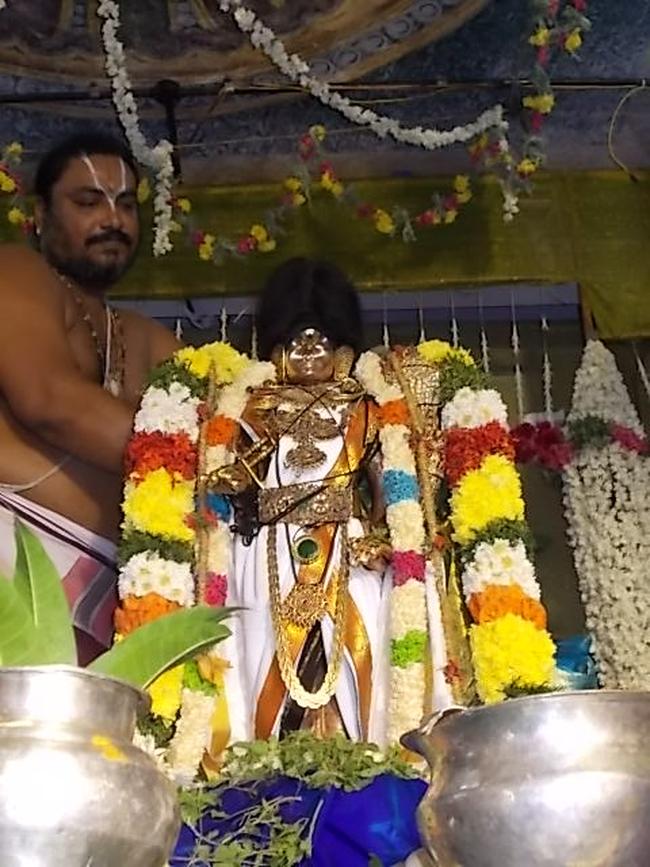GITA 5.12
mudicchOthiyaay* unathu mugacchOthi malanthathuvO,*adicchOthi nee_ninRa* thaamaraiyaay alarnthathuvO*,kadicchOthi kalanthathuvO?* thirumaalE! katturaiyE.padicchOthi aadaiyodum* palkalanaay,* ninpaimpon
In this Thiruvaimozhi (3.1.1), Nammalwar appreciates the beauty of the Lord. He asks whether the face is radiant because of the brilliance of the Crown, or because of the radiance of the face, the Crown is dazzling? Whether His feet induces radiance in the lotus pedestal or the lotus below is illuminating the feet? The Lord is beautiful and so He is called Sri Kallazhagar. This hill is called Vrushabadri and the stream Silambaru makes it eminent.
 |
| People waiting to have bath in Silambaru |
How did this stream originate? The Lord took Sri Vamana Avatar and in the process He took Sri Trivikrama Avatar and grew gigantically. He lifted His left foot to measure the upper worlds and it went beyond the Seventh world, Satya Loka , which is the abode of Brahma. As we would welcome a guest in our house by washing guest's feet, Brahma wanted to wash the feet of the Lord and with rain god Varuna in his pot [kamandalam], washed the Divine Foot. Part of the water washed the noopuram or silambu [an ornament worn on the ankles of the feet]. This portion of the water came from the sky and branched as two steams. One became Vaigai river in Madurai and the other flows as a stream here and so it is called, Silambaru. It is also called Noopura Ganga. Here one important festival is celebrated annually. This is on the Shukla Dwadasi of Tamil month Aippasi [Oct-Nov]. Sri Kallazhagar, comes up the hill, from His sannidhi, and rests on a rock where the Silambaru comes as a waterfalls. Origin point of the river is not known. The water falls on His crown and we can enjoy seeing the Lord behind a water screen. This is called Thotti Thirumanjanam.
 |
| Sri Kallazhagar in Thotti Tirumanjanam |
 |
| Sri Kallazhagar behind the water flow |
 |
| The Lord after Tirumanjanam |
Seeing the Lord behind the water falling from Silambaru, is an awesome sight! Many devotees bathe in the water bathed by the Lord! The Lord arrives here for oil bath. TirumAlaiANdAn was one of the disciples of Sri Alavandar, and he taught Swami Ramanuja, Tiruvaimozhi. He was born here in Tirumaliruncholai. He died in Aippasi (Oct-Nov) on Shukla Dwadasi. His son was Sundara Tholudaiyan. Normally, in the annual thithi, one does some rituals for the deceased persons and during that time, Brahmins are invited and fed. In one such thithi, no Brahmins came for feeding and to avoid disappointment, the Lord Himself appeared as a Brahmin and ate the food offered. It is customary for the Brahmins to have oil bath before food, and so to mark that incident, the Lord arrives on the day of Thithi of Tirumalai Andan, for oil bath, here.
Lots of monkeys are here. They might jump on us, if we have some articles of interest to them. Otherwise, the monkeys do not disturb us! The 12th sloka we are to see, has some similarities! Sri Krishna has been advising Arjuna to do karma yoga, without the feeling I-am-doing and without any desire for lower rewards. Because aspiring low rewards for our karma, puts us back again in samsaram. But if our objectives are for Atman sakshatkaram, the same karma will lead us to Moksham. Our service for selfish reasons will not get us punya. Now sloka 12:
yuktah karma-phalam tyaktva
shantim apnoti naisthikim
ayuktah kama-karena
phale sakto nibadhyate
shantim apnoti naisthikim
ayuktah kama-karena
phale sakto nibadhyate
The steadily devoted soul attains unadulterated peace because he offers the result of all activities to Me; whereas a person who is not in union with the Divine, who is greedy for the fruits of his labor, becomes entangled.
"The steadily devoted soul attains unadulterated peace because he offers the result of all activities to Me; whereas a person who is not in union with the Divine, who is greedy for the fruits of his labor, becomes entangled."
Sri Krishna talks about two persons: Yuktah and Ayuktah. Yuktah does not allow the mind drifting everywhere, but concentrates on Atman. Yuktah = such a person, tyaktva = foregoing or relinquishing, karma-phalam = the result of his actions, naishthikim = permanent, shantim = the selected great experience of Atman, apnoti = attains. A person, performing Karma yoga, conquering the sensual desires of the organs, and concentrating on Atman, attains everlasting experience of Atman. Ayuktah = (on the contrary) person involved in all sense desires, kama-karena = pursuing such desires, phale saktah = aspiring for lower rewards, nibhadyate = gets immersed in samsaram. Same action, when done with not aspiring for lower rewards, makes him to attain higher rewards; but, if done with desires, gets lower benefits. Like the monkey, samsaram attacks him, who is having selfish desires. Nature gives everything for others. If we do action only for results, we will get immersed in samsaram, more and more. Selfless service will get us everlasting Atman anubhavam. Shanti means Atman anubhavam and it is naishthikim or everlasting. We should do every karma without expecting any rewards.
(continued)
No comments:
Post a Comment